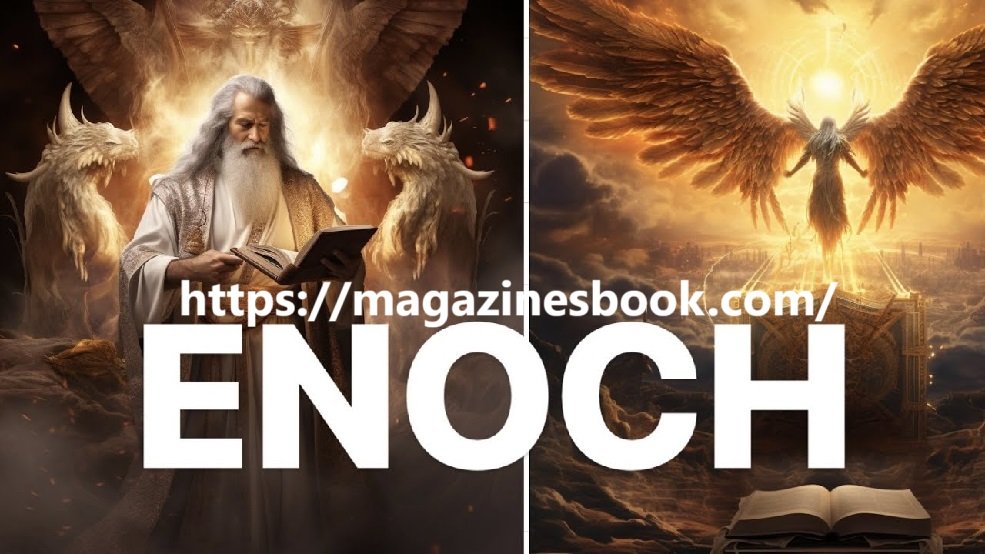Introduction
The Book of Enoch is an ancient Jewish text that has fascinated scholars, theologians, and historians for centuries. Although it is not part of the canonical Bible for most major branches of Christianity and Judaism, it has played a pivotal role in shaping religious thought, particularly in early Christianity. The book contains stories of angels, fallen beings, and divine judgment, themes that resonate in biblical scripture. This article will explore the origins, content, significance, and ongoing debates surrounding the Book of Enoch.
What Is the Book of Enoch?
The Book of Enoch is a collection of ancient Jewish writings attributed to Enoch, the great-grandfather of Noah, a figure mentioned in the Book of Genesis. The text is part of what scholars refer to as “pseudepigrapha”—writings attributed to a famous person that were not necessarily written by them. Although it is not recognized as canonical in most Jewish or Christian traditions.
Enoch himself is a relatively obscure figure in the Old Testament, mentioned in Genesis 5:18-24.
Historical Context and Authorship
The Book of Enoch is believed to have been written during the Second Temple period, sometime between the 3rd century BCE and the 1st century CE. Scholars believe that it was composed by multiple authors over a period of time and consists of five main sections:
- The Book of the Watchers
- The Book of Parables (Similitudes)
- The Astronomical Book (The Book of Heavenly Luminaries)
- The Book of Dreams
- The Epistle of Enoch
These sections cover various topics, including visions of heaven, the fall of angels, prophecies, and a detailed description of the cosmos.
Content Overview
1. The Book of the Watchers
The most well-known section of the Book Enoch, the Book of the Watchers, tells the story of angels who descended from heaven and mated with human women, producing a race of giants called the Nephilim. These angels, known as the Watchers, defied God’s laws and brought forbidden knowledge to humanity.
This story is one of the earliest accounts of the “fallen angel” motif, which would later influence Christian thought, particularly in relation to the figure of Satan and demons.
2. The Book of Parables
The Book of Parables introduces messianic themes, which are often interpreted as foreshadowing the coming of Jesus Christ in Christian theology. In this section, Enoch is granted visions of divine judgment, where the righteous are rewarded, and the wicked, along with the fallen angels, are punished.
3. The Astronomical Book
This section offers an intricate description of celestial bodies, the movement of stars, and the workings of the heavens. It explores the idea of divine order in the cosmos and emphasizes Enoch’s unique role as someone granted special knowledge of the universe’s inner workings.
4. The Book of Dreams
In this part of the Book of Enoch, the protagonist experiences a series of visions or dreams about the history of the world, both past and future. These visions include symbolic representations of historical events and spiritual truths.
5. The Epistle of Enoch
The final section, the Epistle of Enoch, focuses on ethical teachings and apocalyptic prophecies. It calls on people to live righteously and warns of impending divine judgment. The epistle emphasizes the importance of faithfulness and obedience to God’s laws.
The Influence of the Book of Enoch
Influence on Early Christianity
The Book of Enoch had a significant influence on early Christian thought. Its themes of divine judgment, the role of angels, and the coming of a messiah closely align with Christian doctrine.
Additionally, certain New Testament writings, particularly in the Epistle of Jude, echo themes found in the Book Enoch. For example, Jude 1:14-15 quotes directly from Enoch, referencing his prophecy about the coming judgment.
Influence on Jewish Mysticism
The Book of Enoch also influenced Jewish mystical traditions, particularly in its discussions of angelology, cosmology, and eschatology (the study of the end times).
The Book of Enoch and Modern Scholarship
In modern times, the Book of Enoch has gained renewed interest among scholars and religious enthusiasts. Its discovery among the Dead Sea Scrolls in the mid-20th century was a significant moment, as it confirmed the text’s antiquity and relevance to ancient Jewish religious traditions. The scrolls contained several fragments of the Book Enoch, reaffirming its place in Jewish thought during the Second Temple period.
Scholars continue to debate its authorship, dating, and the extent of its influence on other religious texts. Additionally, many people interested in Christian mysticism, angelology, and apocalyptic literature turn to the Book of Enoch as a source of deeper spiritual insight.
The Controversies Surrounding the Book of Enoch
The Book of Enoch is not without controversy. Its portrayal of angels, especially the Watchers, and its focus on apocalyptic themes have made it a subject of theological debate. Some argue that it contains esoteric ideas that conflict with established religious doctrines, while others see it as an essential text for understanding early Jewish and Christian beliefs.
One particular point of debate is its description of the Nephilim and fallen angels, which has inspired various interpretations ranging from literal to allegorical. Some modern interpretations link these stories to extraterrestrial theories, adding another layer of intrigue and controversy.
Conclusion
The Book of Enoch is an enigmatic and influential text that continues to fascinate scholars, theologians, and religious enthusiasts alike. Whether viewed as a historical artifact or a source of spiritual wisdom, the Book remains a compelling subject for exploration.
FAQs
What is the main theme of the Book of Enoch?
The main themes of the Book include the fall of angels, divine judgment, and the apocalyptic vision of the end times. It also explores ethical teachings and cosmology.
Is the Book of Enoch still relevant today?
Yes, the Book remains relevant in religious studies and is studied by those interested in ancient religious texts, angelology, and apocalyptic literature.
Read More:
